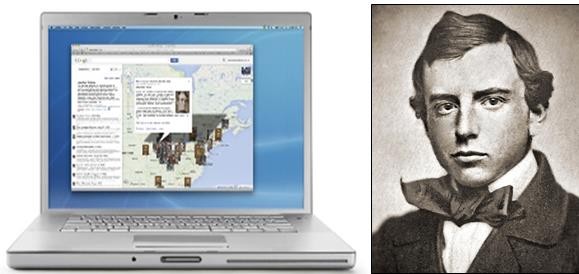Searching yields hits. Researching makes connections.
That is the mantra that all good undergraduates should adopt and appreciate. As convenient and as helpful as search engines can be (and they are amazing in that respect), they offer up a number of deadly traps for the serious researcher. The blizzard of information that results after a typical Google or Yahoo! search is not always helpful and sometimes can be downright misleading.
If you want to learn more about how to navigate search engines effectively, check out this helpful post from Teachinghistory.org. They offer practical guidance on critical issues such as how to use Boolean operators more effectively or where to find the deep web. If those terms are new to you, then you definitely need to check out that post.
But for class on September 22, students in the digital humanities seminar should focus on trying to experience the difference between search and research by conducting their own little experiment. Pick a figure from the first seven chapters of The Education of Henry Adams whom you want to know more about and then try both “searching” and “researching” that person. How do the results compare? Now, of course, there are many ways to conduct such an experiment, but for the sake of time, here’s how students in our class should proceed:
- Identify some historical figure whom Adams describes in The Education and figure out if that person has both a Wikipedia entry and an entry in American National Biography Online. Once you find somebody who’s interesting enough to you and meets these criteria, then proceed to step 2.
- Create a private post at the course website titled by the name of your subject (e.g. “Charles Sumner” or “Louisa Catherine Adams” –both of whom, by the way, meet the criteria).
- Type or paste in some short, memorable quotation from Adams describing that figure (make sure to include page numbers in parentheses)
- Carefully compare the two entries (from Wikipedia and ANB) and if you have time, draft a few sentences in your post that summarizes the main similarities and differences between them.
- Wikipedia entries, of course, are easy to find via any search engine. They almost always top the list of search results.
- American National Biography is ONLY available to you through the Dickinson College Library Databases. If you’re on the college network, or accessing it remotely, then you should be able to find a host of “deep web” resources, including ANB online. It won’t take you long to figure out how to search ANB, but give yourself a few minutes to get familiar with the interface.
- NOTE –If you want to do a European figure (like Garibaldi or Heine), then DON’T use ANB from the Dickinson databases, but instead do use Encyclopedia Britannica Online (which is also available through the Dickinson College Library Databases).
Let the re-searching begin!
